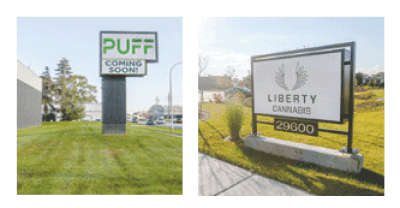
Liberty Cannabis and Puff Cannabis are the two marijuana companies currently operating in Madison Heights. The city is considering revising its ordinance to increase the number of available licenses for medical and recreational marijuana businesses.
File photos by Patricia O’Blenes
MADISON HEIGHTS — The Madison Heights City Council is reviewing proposed amendments to the code of ordinances that would allow for more marijuana businesses to possibly open in town.
The proposed changes were approved on first reading at the meeting Sept. 26. Of the seven council members, three voted against it: David Soltis, Quinn Wright and Emily Rohrbach.
Voting in favor of the amendments were Mayor Roslyn Grafstein, Mayor Pro Tem Mark Bliss, and council members Sean Fleming and Toya Aaron. The changes will only go into effect if they are approved on second reading at the council meeting Oct. 23.
The proposal consists of two amendments. The first would increase the number of medical marijuana facility licenses for Class C growers (1,500 plants) from three to five. The second would increase the number of adult-use recreational marijuana facility licenses (processor and retailer) from three to five. In addition, it would allow for more recreational Class C grow licenses, increasing the limit from 15 to 25.
For each amendment, the revision would also clarify that if a license is vacated or revoked, there is no requirement for the city to reissue the license to an alternate party. Instead, it would be at the discretion of the council to leave the license open indefinitely or seek applicants for it.
If the amendments are approved Oct. 23, the city’s “Green Zone Map” will also be revisited in a separate authorizing resolution. The map will determine the allowable locations for new licensees.
Today, there are two marijuana companies operating in Madison Heights. Liberty Cannabis, located at 29600 Stephenson Highway, opened in June 2021. Puff Cannabis Company, 2 Ajax Drive, opened near the end of 2021.
A third company, Quality Roots, has also been approved, with construction currently underway at 350 E. 14 Mile Road. Quality Roots is expected to open in late 2023 or early 2024.
In a statement, Madison Heights City Manager Melissa Marsh said, “The city has been sued by several marijuana license applicants who weren’t selected, and we are in the early stages of litigation. City policy is to not comment on pending litigation.”
Bliss said the city’s legal counsel recommended the changes as a way to settle the lawsuit.
“I know there are many residents who are flat-out opposed to cannabis. Many of them are relatives of mine, and I understand their point of view. But regardless of whether I agree is completely irrelevant at this point. Being opposed to it when it’s legalized and already here — and when there is so much more we could lose fighting these lawsuits — just isn’t practical,” Bliss said.
“You have to ask the pragmatic question: Is it worth fighting a lawsuit and spending taxpayer money on that, or can we allow a few more licenses and receive more revenue and developments while getting out of those costly lawsuits,” he said. “That’s ultimately the math here. And the reality of the situation is we would not be doing this if our legal team didn’t advise us to settle these lawsuits.”
Rohrbach did not return requests for comment by press time. Wright commented via email.
“I voted ‘no’ because I didn’t believe this is the best choice for our residents,” Wright said. “While I can appreciate the benefit of redeveloping dilapidated buildings and the potential impact on our budget, I am concerned about the residual impacts on our kids and community overall. I respect each of my fellow council members’ opinions and believe there are valid arguments on both sides of the issue, but as it was presented, I do not agree or think it’s the direction we should go as a city and community.”
Aaron said she had mixed feelings, at first.
“I was originally very opposed to allowing more of these in the city, since we had promised the residents we would only do three, and now we may move to five. But since then, we’ve come to better understand the way that these companies’ investments are helping the city,” Aaron said. “We are getting bigger tax breaks from these businesses, so that’s more money coming into the city, and they are helping with public safety, getting better vehicles and equipment for our police and firefighters. They help to keep our taxes lower, and even if they were to flop, we would still have a better building that’s no longer blighted, where we could put something else at a later date.”
She also shared an idea to take some of the money that the marijuana companies contribute to a city community fund, and possibly use it to help the Madison District Public Schools fund their share of a school resource officer at Madison High School. The city has already assigned an officer to the Lamphere Schools after that district met the funding requirements.
Soltis said he was opposed to marijuana companies from the very start.
“And for multiple reasons,” Soltis said. “They’re cash businesses, which can make them targets for robbery. And we’re supposed to be a city that looks out for our kids, telling them to stay away from drugs, but then we turn around and have marijuana companies, so what does that say? We’ve got vaping, liquor stores all over the place, and now we’ll have ample marijuana companies. The response is, ‘Oh, the kids wouldn’t be able to get in there,’ but we all know someone else can get it for them. This is all about the money that the city can get out of it. It makes me feel the city is being hypocritical because it keeps going back on its own limits when there’s more money to be had.”
Fleming, who voted in favor of the changes, said the industry holds promise for the city.
“The marijuana industry is thriving. People are still investing in it, which brings more income into our city. And each licensee contributes thousands of dollars a year to a community fund that we’ve set up, where the board members decide to spend the money on events and amenities and upgrades around town,” Fleming said. “They also fix up the large, blighted buildings they move into, which is another benefit. Those buildings have been an eyesore for a long time.”
“I think we’re at a point where the marijuana industry is already here and it’s not going away, and while some people have certain feelings about it, I think there are benefits to the money these businesses are willing to invest here. And the marijuana itself, it has medical benefits for many, including veterans with post-traumatic stress disorder.”
Grafstein, the mayor, said in an email that the original intent with her voting to approve marijuana businesses in the city in 2018 was to renovate or demolish and rebuild some of the town’s worst vacated or dilapidated buildings.
“Initially, the city was going to allow up to six cannabis properties to operate among three categories of licenses: dispensary, plant grows, and product processing. But instead of approving six stand-alone locations, all the applications were for businesses that bundled all three licenses together, thus reducing availability of locations while maintaining the same number of licenses. As expected, these existing dispensaries have made significant economic contributions to the city, with an increase in taxable property that allowed us to reduce our millage last year,” Grafstein said.
“The original language of the ordinance was designed so that Council could change the number of locations from time to time, so this was always a possibility,” she noted. “Changing our ordinance to allow more licenses does not mean that they will be issued. It is just opening up the possibility, should an opportunity arise where that is the best decision for the city and our residents.”
Bliss added, “Our legal team, our staff, and the majority of council truly believe, with all the details involved here, (the amendments) are the best deal we can possibly get for our residents.”
 Publication select ▼
Publication select ▼


























